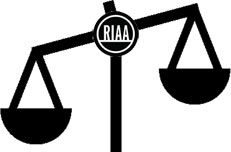We have previously explored the problems of getting a fair trial inside the courtroom. However, public perceptions and information around the world in general also affects a trial. In a civil case, the verdict goes to the person that most convinces the jury, and juries tend to believe what they ‘know’. The likelihood that what they ‘know’ is material published by, and on behalf of the complainant often doesn’t enter into peoples minds.
Perhaps the most insidious aspects of propaganda is that you often don’t know when you’re witnessing it. One of the easiest ways to define it is as something that presents a clear position on a topic, good and bad, with little reference to the facts in an attempt to sway a group of people into believing a certain thing. There are three examples of this to draw on. One is the term ‘intellectual property‘. It’s a term that infers that copyright is a property that can be owned, and by extension, can thus be ‘stolen’. In actuality, it is as its name suggests, a right of copying. However, the term ‘Intellectual Property’ continues. It’s also got the secondary aim of making it seem appropriate to lengthen terms, as by terming it property, and not a right to an action, it’s defined as an asset. Assets are easier to ‘protect’ than a right to do something, certainly over a monopoly-control of distribution.
The second is the association with ‘theft‘ and stealing. Copyrights can only be ‘stolen’ if the actual rights are taken by someone. That is, if the person who owns the right has the right taken from them by someone else. That is also why copyright cases are not theft cases, although cases treated as such would actually be better, as criminal cases have a lot fewer of the problems identified in part 1, as we have also pointed out in the past. It would also significantly reduce the penalties. As Prof. Lessig pointed out in Free Culture (Pg 190), under California law the biggest penalty for stealing a CD is $1,000 – for infringing the copyright of that same CD it’s $1,500,000 (assuming 10 tracks).
The third and most important, are the oft touted ‘loss figures’ and studies. Every month or two an industry group, or company paid by an industry group publishes a ‘losses due to piracy figure’ or other claim. These figures attempt to quantify the unknown (and unknowable) and give a number that can be used in statements. The problem with all of these numbers is that they’re guesswork and estimation, just dressed up nicely. It’s impossible to tell what people are doing, and how many are actually infringing copyright so any figure on the amount of copyright infringement is just a guess. Then there is the question of how much that infringement impacts sales. So far industry data says it reduces sales, while independent studies show it either doesn’t affect them, or increases them. However, they’re not consistent on how much effect there is – some industry studies vastly contradict others with their values for the same thing (such this example)
Nor is this a new thing. Who can forget then MPAA president Jack Valenti calling the VCR the ‘Boston Strangler’ of the film companies. A few short years later that same Boston Strangler was providing those film companies with the majority of their income. The same thing happens time and time again, player pianos, radio, cable TV, the VCR, and now computers and the Internet. Like Chicken little, the sky didn’t fall down the last few times, and is unlikely to now for those companies, if, as before, they adapt and embrace the new technologies. Else they’ll go the way of the big train companies when 40-ton trucks became common, or saddlers and livery stables when the car was made affordable; an anachronism of old technology.
Of course, at the end of the day it comes down to the law. Again, there’s a problem. When you have politicians that are paid heavily by the copyright industry, or judges that are part of an industry group, then the laws are not going to have a firm basis in reality, nor will there be a fair and impartial evaluation of those laws. In some cases, prominent members of the music industry have been let off their crimes by court systems, such as in Nashville where Universal exec Ken Robold and singer-songwriter John Hiatt have had their traffic offenses dismissed.
Given everything we’ve covered, at least briefly, it’s clear that a fair trial when it comes to P2P will be impossible to be had any time soon.


 We have
We have 



